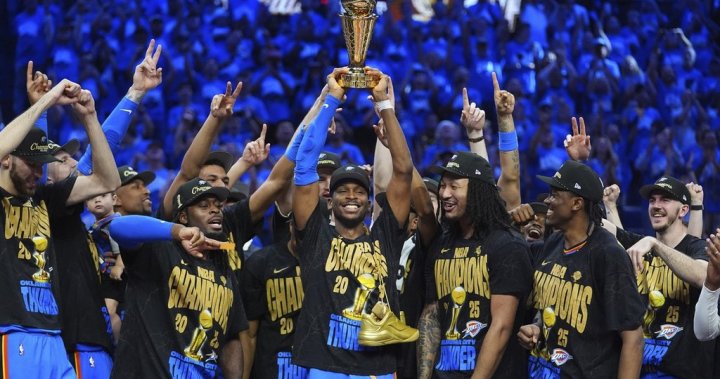The hardwood floors of Boston’s TD Garden and Dallas’s American Airlines Center have become unexpected showcases of Canadian basketball excellence this NBA Finals. As the Celtics and Mavericks battle for championship glory, a quiet revolution continues to unfold—one where the maple leaf is becoming as familiar a sight in professional basketball as the stars and stripes.
With a record-tying four Canadian players participating in this year’s Finals—Dwight Powell and Kelly Olynyk for Dallas, and Boston’s Khem Birch and Mfiondu Kabengele—we’re witnessing the culmination of decades of basketball development in a country traditionally dominated by hockey narratives.
“What we’re seeing isn’t just a lucky coincidence,” explains Montreal-based basketball scout Jean Levesque. “This is the result of systematic growth in Canadian basketball infrastructure, inspired by the Toronto Raptors’ arrival in 1995 and accelerated by their 2019 championship.”
The numbers tell a compelling story. According to Basketball Canada, participation in youth basketball has increased by nearly 70% in the past decade. Meanwhile, Canada now consistently ranks second only to the United States in producing NBA talent, with 22 Canadians on opening-night rosters for the 2023-24 season.
This Finals appearance for multiple Canadians builds upon the foundation laid by trailblazers like Steve Nash, but represents something different—a normalization of Canadian excellence at basketball’s highest level. Powell, a Toronto native, has become a reliable veteran presence for the Mavericks, while Olynyk’s versatile skillset has provided crucial depth for Dallas’s championship push.
The impact extends far beyond the court. Television ratings for NBA games in Canada have reached unprecedented heights, with viewership increasing approximately 32% year-over-year according to recent media reports. Basketball equipment sales have similarly surged across Canadian sporting goods retailers.
“These players are creating tangible pathways for young Canadians to dream realistically about NBA careers,” notes Sophia Williams, youth basketball coach in Vancouver. “When kids see Canadians not just making NBA rosters but contributing meaningfully to championship-caliber teams, it transforms their perception of what’s possible.”
The ripple effects promise to reshape Canada’s sporting landscape for generations. Basketball infrastructure continues to expand nationwide, with new courts, training facilities, and development programs emerging even in smaller communities historically dominated by hockey and other winter sports.
Canada Basketball, the sport’s national governing body, has leveraged this momentum to enhance coaching education, talent identification systems, and international competition opportunities. Their strategic vision increasingly focuses on not just producing NBA players, but developing complete athletes capable of thriving at basketball’s elite levels.
“We’re witnessing the early stages of what could become Canadian basketball’s golden era,” suggests sports historian Dr. Marcus Chen of McGill University. “The combination of institutional development, increased visibility, and tangible role models creates a powerful ecosystem for sustained success.”
For the players themselves, representing Canada on basketball’s biggest stage carries special significance. “Growing up in Canada, you don’t always see this as the obvious path,” Powell noted in a recent interview. “But being able to show kids back home that Canadians belong at this level—that means everything.”
As CO24 Culture has explored previously, sports often function as powerful reflections of broader social developments. The diversification of Canada’s sporting identity—from hockey nation to multi-sport powerhouse—parallels the country’s evolving self-conception in other domains.
What makes this moment particularly significant is its organic development. Unlike deliberate national sports initiatives seen in countries like China or Australia, Canada’s basketball revolution has emerged largely through grassroots passion, institutional adaptation, and the inspiring power of representation.
The future looks exceptionally bright. With teenage phenom Elijah Fisher recently declaring for the NBA draft and projected as a lottery pick, the pipeline of Canadian talent shows no signs of slowing. Basketball Canada’s junior national teams continue to excel in international competitions, suggesting this trend will accelerate.
For a nation that has sometimes struggled to define its cultural identity distinct from American influence, basketball offers an intriguing case study. Canada has embraced a quintessentially American sport and increasingly made it its own, developing players with distinctive styles and approaches that reflect their Canadian backgrounds.
As the Finals continue, these four Canadians aren’t just playing for championship rings—they’re cementing a legacy that will reshape Canadian sports culture for decades to come. Whether lifting the Larry O’Brien Trophy or not, they’ve already secured a victory for Canadian basketball’s place in the national conversation.
The next time you watch an NBA game, pay attention to the player introductions. When you hear “from Toronto, Canada” or “from Montreal, Canada,” remember you’re witnessing not just individual achievement, but the evolution of a nation’s sporting identity. In the ever-changing landscape of CO24 Trends, few developments promise more lasting cultural impact than Canada’s basketball renaissance.
Will hockey ever truly have to share the spotlight as Canada’s defining sport? As the evidence from this NBA Finals suggests, that future may already be here.


















